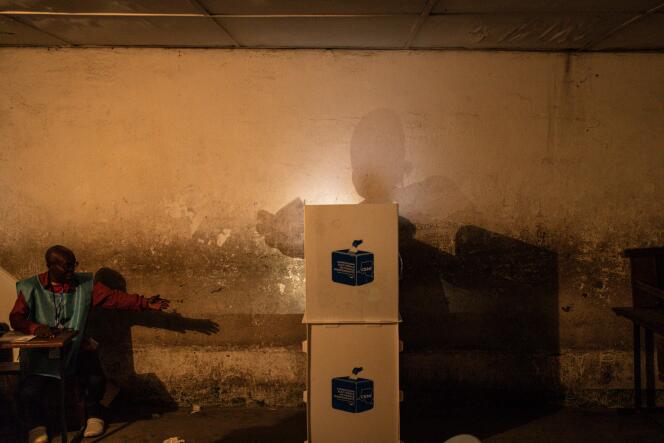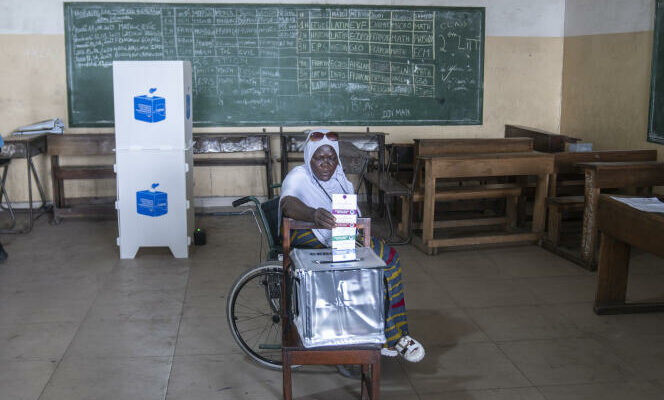It’s a bit like chaos theory: it’s difficult to predict the impact of small initial problems on the final result. In the case of the open presidential election – at the same time as the national and regional legislative elections as well as the municipal elections – Wednesday, December 20 in the Democratic Republic of Congo (DRC), what consequences will the significant delays in starting this day have? high risk?
These delays, which are due to various reasons, however, confirm the fears expressed ahead of the election by opposition political parties and a number of observers. And could fuel doubt about the legitimacy of this election, while the outgoing president, Félix Tshisekedi, 60, is seeking a second term. Facing him, the opposition presents itself in dispersed order.
Until the last moment, diplomats and observers questioned the country’s capacity to organize the vote on the scheduled date, bringing back the threat of a “slip”, as when former President Joseph Kabila delayed it by two years. the 2016 elections in order to stay in power. The logistical challenge is gigantic for the Congolese to be able to express their choice in one of the 75,000 polling stations. In this country of 100 million inhabitants, some 44 million voters are spread over a territory of 2.3 million square kilometers, or four times the size of France.
Brain teaser
In Kinshasa, as elsewhere, the day passed in a certain disorder. The nature of these grains of dust collected in the capital from a non-representative sample of around ten polling stations gives an idea of the extent of the dysfunctions. In the Binza Delvaux district of the commune of Ngaliema, voting had not yet started at 2 p.m. Dozens of people moved moderately in a queue which had started to form at 6 a.m., the theoretical moment of the opening of the poll supposed to be held until 5 p.m.
In the polling station installed within the walls of the Reverend Samba school complex, power cuts are the rule but they became a real headache on Wednesday when the voting machines were delivered with discharged batteries. External lithium batteries had been planned, but it was then impossible to get hold of connection cables. At the start of the afternoon, electoral agents were still waiting for technicians from the Independent National Electoral Commission (CENI) “on the way since 10 a.m.”
These voting machines, according to Bishop Donatien Nshole, spokesperson for the National Episcopal Conference of Congo (CENCO) and the observation mission of the Church of Christ in Congola (ECC), were defective in 45% of cases. offices. A figure established as of 9:30 a.m. based on reports from around a fifth of its vast network. CENCO deployed 25,000 observers throughout the territory of the Democratic Republic of Congo (DRC).
In another office located in the Basoko district, voters waited on shaded stands around a basketball court. At 3 p.m., the machines had not yet arrived, for some mysterious reason. Jean René, president of one of the offices, kept his composure, even though the day before he had decided to sleep there, on the ground, to “welcome voters from the opening, at 6 a.m.”. Peter, a student who was voting for the first time, had indeed been coming since dawn. He came to vote “so that things change in this country, so that we no longer see the same faces”. He wrote down on a piece of paper the numbers assigned to each of his four favorite candidates (the presidential, the two legislative and the municipal) “to find them in the machine” and said he was determined to wait.

“We’re here until tomorrow”
During the last election, in 2018, the CENI had already generalized the use of this tool produced in South Korea: a large tablet into which the voter inserts his ballot and on which his choices made on the ballot are recorded. touch screen. Once the ballot is coded by the machine, the voter places it in a ballot box. Maneuvering on the screen takes several minutes. Or even an eternity for people who are little accustomed, or not at all, to digital practices. This year, new machines were ordered from Korea but most of those used on Wednesday were taken out of Congolese cupboards in which they had slept for five years in a tropical atmosphere saturated with humidity.
It was not just these tablets that posed a problem: in an office in Gombe, a central district of Kinshasa, we were still waiting for the electoral lists to arrive; in another located in Kitambo, wrong ballot papers had been delivered… “We’re here until tomorrow”sighed an electoral agent in the afternoon.
Videos
Le Monde Afrique on Youtube
Every week, videos to understand the news on the continent
Look
Three hours after polling stations opened, more than 31% of them had not yet opened in the main towns, according to Bishop Donatien Nshole of CENCO, who deployed observers. The CENI promised to try to compensate for these delays. Wednesday evening, its president Denis Kadima announced that “offices which have not opened at all will do so on Thursday”without specifying the number of offices concerned.
This declaration of good faith does not convince an opposition convinced that the organs of organization, control and certification of the vote are subservient to power. “It’s total chaos planned by Denis Kadima”, launched Martin Fayulu, one of the main opponents with Moïse Katumbi, after voting in Kinshasa. He once again accused the CENI of wanting at all costs “to pass” Felix Tshisekedi. Moïse Katumbi, considered the main challenger to the latter, asked voters to ” to watch “ counting ” until the end “.
Faced with all these problems, the Archbishop of Kinshasa, Mgr Fridolin Ambongo, a true moral authority, hoped that ” solutions (will be) found quickly, otherwise, the elections will extend over several days ». Cyrille Ebotoko, representative of CENCO observers, however, said he feared “a negative impact on the integrity of the process if it extends over several days”. Scratching his head, a European diplomat wonders: “Why didn’t they delay this vote for a week? »
